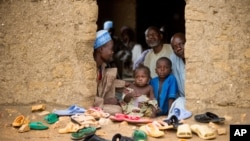The U.S. Agency for International Development, or USAID, is providing more than $311 million in additional humanitarian assistance to 3.8 million food insecure people in the Sahel and Lake Chad Basin regions.
This latest USAID contribution will include rice, grains, vegetable oil, and specialized food for the treatment of acute malnutrition, in addition to vouchers and cash for purchasing food from local markets. This funding also provides psychosocial support for conflict-affected communities, as well as emergency shelter, water, sanitation, and hygiene assistance.
This additional aid comes at a critical time, as the United Nations estimates that more than 35 million people will face food shortages during the upcoming lean season in West Africa - the period between planting and harvest from May to August when food typically runs out across agricultural communities.
In the Sahel, the situation is exacerbated by an existing poor harvest and the effects of conflict that continue to deplete household food stocks and resources. This has resulted in more than 20 million people needing food assistance. The lake Chad Basin is an area in Western Africa that covers Cameroon, Chad, Niger and Nigeria. For the past 12 years violence driven by Islamist terrorist groups Boko Haram and ISIS-West Africa has resulted in 11.1 million people being desperately in need of humanitarian aid. Nearly 3 million people have been forced from their homes, and a lack of adequate shelter, clean water, and basic sanitation as well as severe food insecurity are prevalent throughout the region.
The United States has contributed more than $944 million in assistance to the Lake Chad Basin and Sahel regions combined since October 2020.
To underscore the Biden Administration's commitment to increase collaboration and engagement with Africa, USAID recently attended the third annual General Assembly of the Sahel Alliance for the first time as a full member. This full membership status will offer new opportunities to partner with donors, the private sector, and the host government to help strengthen development and reform efforts in the Sahel.
The United States will continue to look for ways to address growing humanitarian needs in West Africa.






